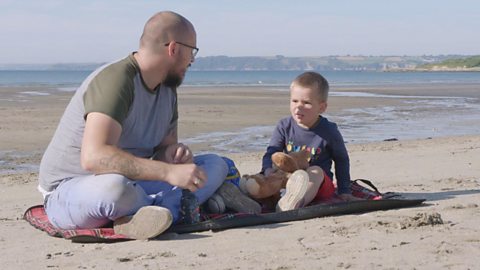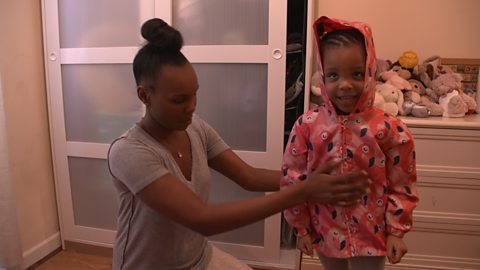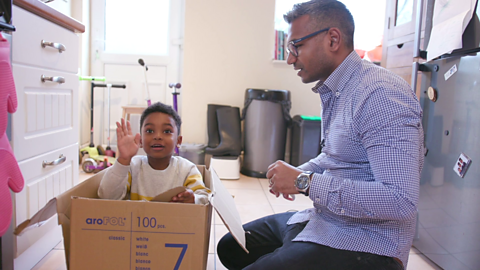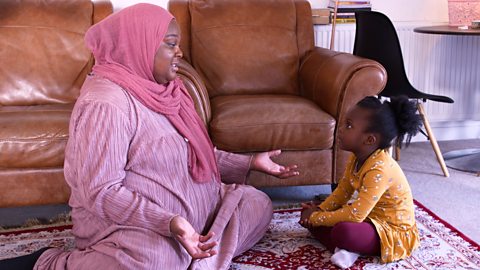Have you found your child’s world is starting to expand beyond the here-and-now?
As their memory develops and they start forming longer sentences, children also learn about new and more complex sentence structures, such as the past and future tense.
And the best way you can help? Give them plenty of opportunities to listen to and talk in these tenses.
The Tomorrow Game is a simple way to encourage talking about the future. Ask your child what they'd like to do tomorrow and take it from there. What will they come up with?
What shall we do next week with grandad?
Truro with grandad!
You'd like to go all the way to Truro with grandad?
Yeah! And what are you going to do in Truro?
Climb up the rocks.
You want to climb up the rocks?
Yeah!
°Â´Ç·É…
I want to go to that park.
So we're going to go to the park?
There's two slides.
Two slides, yes.
I want to go on the red one and yellow.
Okay, and then what else are you going to do at the park?
Have a picnic.
And what's going to be in your picnic box?
Sandwiches.
Why don't we make a plan for tomorrow? What would you like to do tomorrow?
Go in the car, make sand castles, have some ice cream and play with my football.
That sounds like a good plan!
We're going to play at the park first. You're going to play at the park first?
Yeah!
Play football.
Would you like to play some football?
Yeah.
Yeah.What would you like to take?
Car!
A car? What other toys will come with us too?
A toy dog.
And a toy dog?
Yeah! Can daddy come too?
Just grandad.
Just you and your grandad?
Yeah.
Oh…And then you're goin gto have your picnic?
Yeah.
And what are you going todo after your picnic?
Go to the forest.
Oh, you're going to the forest?
Yeah.
Erik, I like making plans with you. Do you think we should make some more plans for next week?
Yeah! Yeah! [Laughs]
What are the language benefits of the tomorrow game?
- Making plans can help your child talk about the future.
- Letting your child get creative with this game, boosts their vocabulary development.
- Using open questions helps children form longer sentences when they answer.
- Letting your child take the lead can help build confidence and creates a space for them to experiment with their language freely.
- This activity encourages children to think abstractly and describe things that aren't in front of them.
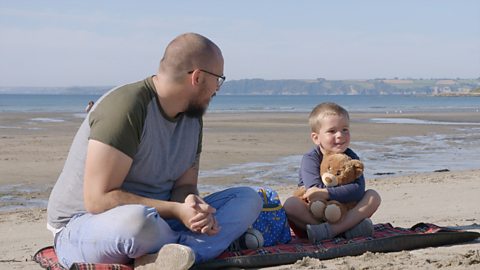
Tips for talking about the future with your child
Ask them what they would like to do and use open questions with words like what and where.
Listen while they talk you through their plans and help them describe ideas beyond the present moment.
You can use pictures for inspiration. Why not look in an old magazine or newspaper? Or even on your phone. If you have a physical copy of the picture, why not cut it out? This could help your little one create a storyline.
Your plans for tomorrow don't have to always be realistic, get creative! Maybe your child would like to go to space, or a witch's tea party.
Another way to introduce the future tense with your child is during storytime. You can help by asking your child questions about stories you have read together.
Ask them what do you think will happen next? Where do you think the character will go? Which item will they choose?
You may find they struggle to use the correct grammar at first, but the more they hear you using these types of sentences and the more chance they have to practice them, the better they will get.
Past and future tense across Tiny Happy People
Learning to talk about the past and future tense is a key part of language learning. We've got loads more information about this across our website.
- Find out why talking about the past and future with your 3-year-old is so important for their language development.
- Has your child learned to time travel yet? This short video explains everything you need to know.
- Check out the ±«Óătv Bitesize learning guide for past, present and future tense.
- Challenge your child's memory with our memory games and check out these top tips from Dr Clare Halsey.


